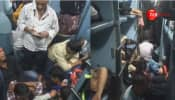New Delhi: The Supreme Court on Thursday said private educational institutions cannot complain about Government`s decision to reserve 25 percent of seats for economically weaker sections (EWS) under the RTE Act as it is an investment for the country`s future prosperity.
A three-judge bench of Chief Justice SH Kapadia, KS Radhakrishnan and Swatanter Kumar observed that that there was nothing wrong in the Government`s attempt to provide 25 percent of the EWS population quality education in private schools.
The apex court however, said it was willing to strike down the legislation if the private schools are able to establish that Constitutional principles have been violated by enactment of the Right to Education Act under which free and compulsory education had been made mandatory for all children in the age group of 6-14 years.
"What is wrong in 25 percent having better education in private schools. Today you are making an investment for the country. Children are the future of the country. Can the court intervene and say it is unreasonable," the bench asked.
The bench made the observation during the hearing of the bunch of appeals filed by private educational institutions challenging the 25 percent reservation for EWS.
The apex court brushed aside the argument of senior counsel and former Additional Solicitor General Vikas Singh that the legislation impinged upon the fundamental rights of the unaided institutions to manage their affairs without governmental control imposed a huge cost burden.
Singh appearing for various private schools argued that providing 25 per EWS deprived the children from themiddle class and rich their seats in the private educational institutions.
In such a scenario he said the displaced children from the middle and rich class have to take seats in Government schools, creating an anomalous situation.
"You may be right but can we go into that arena. It is a legislative policy. You may be absolutely right on the ground realities. But you have to show the Constitutional principles violated.
"If a citizen`s right is violated then they can come to us," the Chief Justice said.
The counsel submitted that the situation would lead to various peculiarities as the Government would end up subsidising the education of the rich and middle class children in government schools.
He cited the instance of the US where the schools are all run by the Government but provide quality education.
But the argument failed to convince the court which said if comparison has to be drawn then it should be done on tax compliance and other matters also.
"Only five percent of the population pays tax in the country. There are only five percent tax payers, out of these three percent are the salaried class.
"We cite the instances of US, Canada and other countries. Then let us talk about the tax GDP in those countries with that of our country," the bench remarked.
The senior counsel gave an illustration that in a state have one lakh seats, if 25 percent seats are reserved for the EWS that wold displace 25,000 students from other sections of the society who may be forced to seek admission in government schools.
The apex court also asked the Additional Solicitor General Indira Jainsing to furnish data if any on the number of students who may stand benefited under the EWS quota.
"The Government is not in a position to incur huge capital expenditure. So what is wrong if the private organisations are asked to discharge certain responsibility?”
"Our population is over one billion. The US does not have it," the bench said. The arguments would resume next week.
The main petitioner Society for Un-aided Private Schools, Rajasthan, and a host of associations representing various private schools have questioned the validity of the Act on the ground that it impinged on their rights to run the educational institutions.
The petitioners had contended that the issues involved in the Act relate to Article 15 (5) and to Article 21(A) of the Constitution.
Article 21(A) says the state shall provide free and compulsory education to all children of the age of six to fourteen years in such a manner as the state may, by law, determine.
Article 15 (5) of the Constitution enables the state to make provisions for advancement of education for weaker sections of society relating to admission in educational institutions.
The petitions contended that the RTE Act, 2009, is "unconstitutional" and "violative" of fundamental rights.
The petitioners cited the Supreme Court`s 11-judge Constitution bench ruling in TMA Pai case wherein it was ruled that maximum autonomy should be provided to private educational institutions.
According to the petitioners, Section 3 of the Act imposed an absolute mandate on all schools, including private unaided and minority institutions, to admit without any choice each and every child whosoever comes to take admission in the schools in the neighbourhood.
PTI















